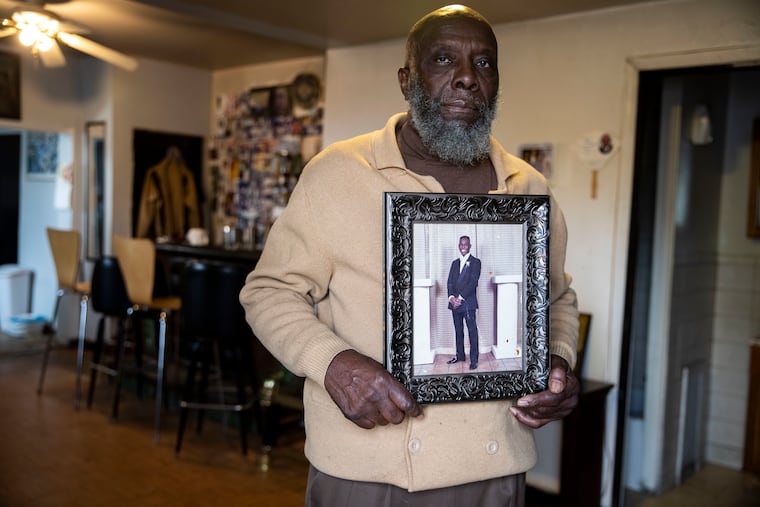Prosecutors want to give a double murderer a chance at parole. One victim’s family says he should stay behind bars.
The Philly DA’s Office and defense attorneys want a judge to approve a plea deal of 35 to 70 years in prison for death-row inmate Derrick Ragan.

Derrick Ragan shot and killed two men.
In June 1990, he shot a man in a dispute over money. Eleven days later, Ragan, then 19, got into a fight over basketball at a playground in Overbrook and shot 22-year-old Darren Brown in the chest, then stood over him and fired more bullets, 13 in all. He then waved his gun in the air and asked, “Does anybody else want some of this?”
Ragan was convicted of first-degree murder in both crimes. He was sentenced to life in prison in the slaying of 22-year-old Anthony Thomas and got the death penalty for killing Brown.
Now, 29 years later, the Philadelphia District Attorney’s Office has asked a judge to vacate both convictions and allow Ragan, 48, to plead guilty to third-degree murder in both crimes, and be resentenced to 35 to 70 years in state prison. That would make him eligible for parole in six years.
“It’s an extraordinary situation,” Assistant District Attorney Paul George said as he asked the judge to approve the plea deal. “It’s unique amongst all of the death-penalty cases that have been in my purview.”
Ragan, he said, has turned his life around, although he offered little evidence beyond that firm conviction.
Common Pleas Court Judge Leon Tucker, who must approve any plea deal, seemed skeptical. At a hearing last month, he said: “My problem — and I am putting it as plain and simple as I can — ... when you have a jury that speaks, no matter how long ago it was, I just have difficulty in disturbing that."
Relatives of one of the victims adamantly oppose any bid for leniency and told that to the judge.
George and Philadelphia District Attorney Larry Krasner, both former defense attorneys, oppose the death penalty, and their actions in the Ragan case underscore that. Krasner, who took office in 2018, had vowed on the campaign trail that he would never seek the death penalty. This summer, he and George unsuccessfully asked the state Supreme Court to strike down the death penalty as unconstitutional.
Even if efforts to vacate Ragan’s convictions fail, he and the 133 other prisoners on Pennsylvania’s death row are unlikely to face execution soon. Gov. Tom Wolf placed a moratorium on the death penalty in 2015.
And the District Attorney’s Office under Krasner has consistently agreed to life in prison for an increasing number of death-row inmates by abandoning challenges to their appeals, many times by agreeing that defendants had ineffective counsel or should have been found intellectually disabled and thus ineligible for the death penalty.
In Ragan’s case, his attorneys, Michael Wiseman of the Center City firm Wiseman & Schwartz and Tracy Ulstad of the Federal Community Defender Office, have raised various claims over the years in attempts to have his convictions and sentences overturned.
They declined to comment on Ragan’s case. Jane Roh, spokesperson for Krasner, said the office would have no comment because the case remains in active litigation.
In asking a judge to vacate Ragan’s convictions, Wiseman said that other than “two incredibly unfortunate incidents,” Ragan’s conduct before the shootings and during his many years in prison “has been exemplary.”
Brown’s family doesn’t buy that.
“By them saying he’s changed, how has he changed?” asked Brown’s brother Wendell. “He murdered somebody in cold blood, stands over him. Why would you want to let him off without even a life sentence? They have me so upset.”
At a recent court hearing, Wendell Brown told the judge he was “appalled" at the idea of a possible plea deal. “This man stood over my brother and shot him 15 times for no reason,” he said. “Didn’t know my brother.”
The sister of Ragan’s other victim, meanwhile, told the court she was OK with the plea deal. “I’m more of a Christian now,” Linda Adams said. “I’m not the same person I used to be 29 years ago.”
At the time of the murder, Darren Brown lived in Overbrook, had a 1-year-old son, and worked as a cook at the Copabanana restaurant on South Street, his family said.
In a recent interview, his father, Ralph Sr., said Ragan should remain behind bars. “I don’t think they should let that guy on the street again,” he said.
Brown’s brother Ralph agreed. “Let him keep changing while behind bars. What’s wrong with leaving it the way it is? They don’t have to kill him.”
The judge is mulling arguments from both sides and is expected to make a decision in the coming weeks.